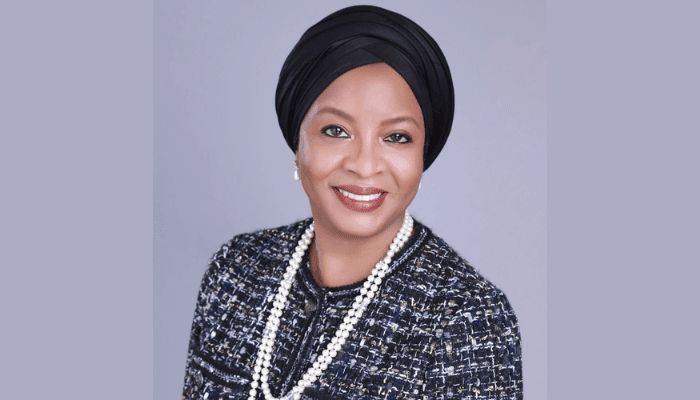Nigeria News
Buhari Reappoints ‘Incompetent’ Official Sacked By Jonathan As Nigeria’s Investment Chief

Former president, Goodluck Jonathan, in 2015 relieved Saratu Umar of her duty as the Chief Executive Officer of Nigeria’s Investment Promotion Commission (NIPC).
Jonathan had sacked Umar following a recommendation by a ministerial panel.
The panel had indicted Umar for several offences, including lack of administrative competence, power-play and ineptitude.
Workers of NIPC in May 2015 had shut down operations to protest against the poor leadership of Umar.
The angry worker demanded her immediate sack from the commission over her “gross incompetence, high-handedness, staff intimidation” and her alleged divide-and-rule policies.
The worker noted that they were tired of her leadership despite her just spending one year as the executive officer of the agency.
The staff union chairman of NIPC, Ahmad Ghondi in a statement said, “Mrs Umar violated so many provisions of the Procurement Act in awarding contracts to her cronies and had been running the commission as a private entity.”
She was also accused of several misappropriations, including approving a contract of N35 million for refurnishing her office.
The Minister of Trade and Investment at the time, Olusegun Aganga following the agitation of the staff, set up an investigative panel, led by one Abdulkadir Musa, then a permanent secretary, to probe the series of allegations against Umar.
The Musa-led committee in April 2015 probed Umar, as recommended by the minister, on several offences, including “indiscriminate mass queries issued to staff; illegal termination of appointments; non-payment of overtime to deserving staff; punitive posting; not attending to files/mail timeously; operational funds”.
Musa and his panel members summoned all “concerned parties” over the grievances listed against Mrs Umar and the management of the NIPC generally.
Upon her assumption of duty as the Executive Secretary of the NIPC, Mrs Umar issued a series of queries to staff for late coming and absenteeism and failure to attend a routine jogging exercise.
But the committee found these queries unjustifiable because “the clocking-in and out were found to be defective.”
The committee also ruled against issuing queries to staff for not attending jogging exercises, saying it was meant to be a voluntary activity.
The committee also found the sack of two NIPC directors by Umar undeserving, noting that the woman violated the regulations of the Federal Service Commission in determining the dismissal of the two officers.
The investigative panellists found her guilty of serial posting of some staff cadre, suspected to be loyal to her, to zonal offices “without any specific assignment or portfolio.”
Umar, the committee found, also failed to conduct promotional exams, denying deserving staff of administrative growth at the expense of the commission’s progress.
“Some of these officers neither had sitting space, tables nor chairs,” the committee stated.
“The case of the current NIPC Union unit Chairman was cited as an example.”
Again, during her administration as the executive secretary of NIPC back in 2015, the investigative panel found that Umar made unilateral decisions, having failed to carry directors of the commission along on several occasions.
The committee said Mrs Umar appeared to have run the commission alone as evidenced by her “failure to convene meetings of the NIPC council where critical matters of general administrations are tabled and determined.”
“The committee observed from the testimony of directors who appeared before it and documents presented that the commission has a weak and divided management structure with the ES running with essentially only one director (acting director of finance and administration) while the other six directors were not being carried along.”
The Musa-led panel noted that the high-handed and authoritarian management style of Mrs Umar caused rancour between her and her directors, leading to an irredeemably broken relationship between the two parties.
“This has created vacuums in critical departments leading to the multiple appointments of acting directors who clearly lack capacity and experience to handle critical issues,” the committee said.
However, the committee said there generally appeared to be a deficit of trust between Mrs Umar and the directorate of the commission. Unfortunately, the panel stated, the directorate had gained the sympathies of the staff who are tired of Mrs Umar’s “authoritarian” leadership style.
“This has rendered any genuine reproaching pretty difficult,” the committee said.
On 8 May 2015, following the protests and industrial actions by the NIPC staff, Mr Aganga wrote Mr Jonathan, the then-president, informing him of his decision to set up a committee to probe allegations about Mrs Umar’s administrative maladies.
The minister said he personally observed that the woman’s high-handedness, administrative lapses and procedural gaps were the roots of the crisis setting the commission on fire.
Aganga also noted that the issues could have been easily resolved in-house but for Mrs Umar’s lack of understanding of the Public Service Rules and regulations and knowledge of human management.
He stated categorically that since Umar assumed the position, she had not exhibited appropriate or any commendable competence in dealing with the administration of the commission.
Aganga said, “I am, therefore, with regret, compelled to recommend that given the circumstances especially the importance of this institution in Nigeria’s drive to attract foreign investment, Your Excellency consider assigning as a new Executive Secretary, a person of suitable competence, seniority and focus befitting our national agenda.”
Relying on the agitations of the staff, the recommendation of the NIPC investigative committee and Aganga’s submission, Jonathen sacked Umar and appointed Aisha Hassan-Baba as the chief executive officer of the agency.
The workers have raised the same allegation following Umar’s reappointment by President Buhari.
The NIPC workers were stunned to hear that President Muhammadu Buhari known for his anti-corruption rhetoric, had reappointed Umar.
According to Premium Times, her second coming, staff in the organisation said Umar has become even more brazen, allegedly reenacting the abuses that typified her initial reign at NIPC.
A few months after her re-emergence, the Independent Corrupt Practices and Other Related Offences Commission (ICPC) said it classified the NIPC as a “high corruption risk institution”.
The platform further stated that hardly had Umar spent six months as a returning head of the NIPC that staffers of the institution started grumbling over her alleged abusive management of workers and official duties. In December last year, a memo from all directors of the commission raised an alarm to draw her attention to pressing matters concerning the growth of NIPC which had been abandoned.
Since she returned to office in July 2022, Mrs Umar was said to have failed to treat files submitted to her, a lethargic attitude towards her duties hampering the growth of the commission, according to the memo.
The memo read in part, “This delay, sometimes running into months, is having a likely unintended consequence on the commissio.”
In another part of the memo, the directors said Mrs Umar has failed to convey management meetings to discuss salient issues affecting the institution.
They said her lack of commitment “constitutes a big gap in the general administration of the commission as directors are not aware of happenings and are not given chances to contribute meaningfully to any activity of the commission.”
Also, since she came back to power, Mrs Umar was said to have refused to consider pioneer status applications in the past year. She had ignored any memo on the subject matter against the directive of the Minister of Trade and Investment.
Insider that spoke with Premium Times said, the pioneer status incentive (PSI) is a tax holiday granting qualifying industries and products relief from payment of corporate income tax for an initial period of three years.
The memo further stated, “Considering the importance of the PSI incentive in providing succour to investors operating within the challenges of the Nigerian landscape, it is concerning that only one meeting has been held. “Even at that, no application was considered.”
On 10 January, Uchenna Okonkwo, the chairman of the Anti-Corruption and Transparency Unit (ACTU) of the investment agency, wrote a petition against Umar over issues bothering on corrupt financial transactions and violations of both the Public Procurement Act and the Financial Regulations of the Federal Republic of Nigeria.
According to a copy of a petition that Premium Time obtained in December 2022, alleged fraudulent transactions running into millions were made under the watch of the NIPC’s head.
She was also accused of making mischievous appointments in the agency, including re-engaging one Mutawalli Kukawa as a “Technical Support”, after retiring from NIPC as a Deputy Director.
For instance, on 21 December 2022, the petitioner alleged, another sum of five million naira was paid to the personal account of one Yusuf Mustapha as a resource person in an event insiders said was never held.
“This payment was in contravention and violation of Extant Financial Regulation, Federal Treasury Circular on E-payment and Public Procurement Act which caps the amount payable to any public officer for procuring goods and services not to exceed N200, 000,” Okonwo added.
He alleged that payments to Mr Mustapha’s account, whose tenure as chairman of the Staff Union expired in July 2022, were approved because of his relationship with Umar.
“She also added to his nomenclature the designation of Project Accountant II to make it look like a special project knowing fully well he is not an Accountant and therefore cannot be designated as an Accountant,” Okonkwo added.
Classified records reviewed by the platform shows, another sum of five million naira was paid to one Wange Dia, a Deputy Director in the General Service Department of the NIPC, including payment receipts.
The fund, the documents revealed, was to settle members of the press for an event yet to occur in clear breach of the above-stated financial regulation and procurement acts.
“Payment for honorarium can only be made to the supposed resource persons who – in this case – do not exist,” a staff of the NIPC, who spoke on condition of anonymity said.
“The total sum of 1om for honorarium is fraudulent; the event has not occurred. And the only one of such events had no resource person.”
In November 2022, a help-seeking petition against Mrs Umar was written to the Federal Ministry of Industry, Trade and Investments. In the petition, a number of NIPC senior workers accused Mrs Umar of unlawful sack and unprofessional redeployment of staff members and violating laws of the agency and public service.
On 22 November 2022, Emeka Offor, a senior director of the commission, was “maliciously sacked” by Mrs Umar, a development some insiders said caused controversies in the institution.
They insisted that the termination of Mr Offor’s appointment by Umar was done without getting approval from the head of the civil service of the federation.
Premium Times has reviewed a number of petitions against Mrs Umar over alleged high-handedness towards directors or staff members she considered not loyal to her. In one instance, in a petition addressed to Nigeria’s labour ministry, a group of NIPC directors complained they were denied their promotions in favour of Umar’s loyalists in the commission.
“The last promotion exams conducted in the commission was in 2020,” a part of the petition read. “In 2021, a substantial number of us became due for promotion but because of some internal wranglings within the commission, our exams did not hold.”
They also accused her of physical abuse.
“This threat of physical assault and threat to life is the climax of the Executive Secretary’s threat to sack staff, actual punitive postings and general harassment, insults and maltreatment of directors and staff of the commission,” the petition, addressed to the State Security Service (SSS), reads in parts.
But then, NIPC appears to be a government agency with many controversies around leadership and administration. Before the re-emergence of Ms Umar in 2022, for example, the staff of the commission had staged protests against the administration of Yewande Sadiku, NIPC’s former Executive Secretary, demanding her removal over allegations of corruption.
The crisis lingered till the end of Sadiku’s tenure as the head of the commission after which she was cleared of all allegations by Nigeria’s anti-graft agencies.
Umar’s return has refuelled the crisis facing the commission.












